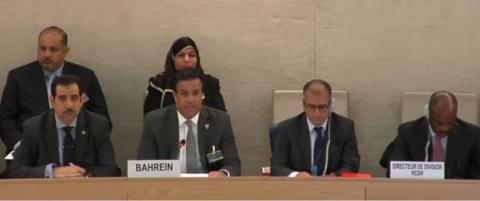
On 3 May 2015, the Working Group on the Universal Periodic Review (UPR) adopted a draft report containing 176 recommendations made by United Nations Member States to Bahrain during the State's review, which took place on 1 May 2017. During the review, States expressed concern over Bahrain's human rights situation, especially regarding the practice of torture, the death penalty, lack of independence of national mechanisms to protect human rights, infringements to civil and political rights, as well as the deprivation of citizenship. Alkarama previously raised all these issues in its September 2016 report submitted to the Human Rights Council (HRC) ahead of Bahrain’s review.
Practice of torture and death penalty
Despite Bahrain’s ratification of the Convention against Torture and Other Cruel, Inhuman or Degrading Treatment or Punishment (UNCAT), torture is yet to be eradicated. In fact, and as emphasised in Alkarama’s report, torture remains a persistent problematic as it is often used in Bahrain. During the UPR, a large majority of States, including Luxembourg, Germany, Switzerland, Italy, France, Senegal, Spain, Uruguay, Czechia, Cyprus, Portugal, Ghana, Denmark and Norway, recommended Bahrain to investigate allegations of torture while ensuring accountability of perpetrators. They further recommended Bahrain to ratify the Optional Protocol to the UNCAT, to take the necessary steps to establish an independent, effective and well-resourced National Preventive Mechanism, and to allow the Special Rapporteur on torture (SRT) to visit the country.
Furthermore, Bahrain continues to sentence people to death. The recent execution of three men on 15 January 2017 set an alarming precedent, as it was the first execution carried out since 2010. Meanwhile, dissidents continue to be sentenced to death after unfair trials based on confessions extracted under torture. As a result, in its report, Alkarama called on UN Member States to recommend Bahrain to review all sentences handed down on the basis such confessions and establish a moratorium on the death penalty. During the review, several States, including Belgium, Norway, Montenegro, Spain, Bulgaria, Sweden, France, Australia, Austria, Luxembourg, Lithuania and Italy, echoed Alkarama’s concerns recommending Bahrain to suspend without delay all executions, commute all death sentences and establish an official moratorium on the application of the capital punishment.
Lack of independence of national mechanisms to protect human rights
Bahrain’s mechanisms to protect human rights, such as the National Institution for Human Rights of Bahrain (NIHR), the Office of the Ombudsman of the Ministry of Interior, the Ombudsman of the National Security Agency, and the Special Investigations Unit, were established following the recommendations of the Bahraini Independent Commission of Inquiry (BICI), mandated to investigate allegations of human rights violations following the 2011 uprisings. These national mechanisms, however, have been strongly criticised over the years due to their lack of independence, transparency and compliance with international standards. During the UPR, several Member States, including the US, New Zealand, Montenegro, Korea, Indonesia, Libya and Sweden, encouraged Bahrain to strengthen these human rights institutions so that they can fulfil their mandates effectively, independently and impartially.
Infringements to civil and political rights
Despite its commitments, Bahrain continued to regularly limit and in some cases severely punish the exercise of the rights to freedom of expression, association and peaceful assembly. As emphasised in Alkarama’s report, these rights are restricted by an oppressive legal arsenal, particularly the 2006 Anti-Terrorism Law and the 2002 Press Law, which were repeatedly used to punish peaceful activists, human rights defenders, journalists and political opponents on account of their statements or public positions against the government, especially on social media. The repression against the opposition results in abusive arrests, often for political reasons, travel bans or stripping of nationality.
During the review, several States, including Spain, Switzerland, Germany, the US, France, Estonia, Botswana, New Zealand, Palestine, Iceland, Iraq and Lebanon, recommended Bahrain to guarantee freedom of expression, association and peaceful assembly and to end the intimidation and harassment of human rights defenders, journalists and civil society organisations. They further asked the government of Bahrain to “review convictions, commute sentences, or drop charges for all persons imprisoned solely for non-violent political expression.”
Revocation of citizenship
Under the Bahraini Citizenship Law of 1963 amended in July 2014, revocation of nationality is possible upon request of the Minister of Interior, against any Bahraini citizen who “causes harm to the interests of the kingdom”. In its report, Alkarama underlined the use of deprivation of nationality as a tool of repression against political opponents and human rights activists and called on UN Member States to recommend Bahrain to put an end to politically motivated deprivations of nationality. During the review, and contrary to the previous UPR, when no recommendations were made on the matter, numerous States, including Belgium, Denmark, Mexico and Czechia, recommended Bahrain to end the practice of arbitrary revocation of citizenship as a form of punishment.
What is next?
Overall, Bahrain received 176 recommendations from UN Member States, which the country must consider before September 2017 and inform the Human Rights Council of whether these are accepted or rejected. The State should then implement the accepted recommendations until its fourth UPR cycle in 2021, in order to improve the human rights situation on the ground.
For more information or an interview, please contact media@alkarama.org (Dir: +41 22 734 1008).
